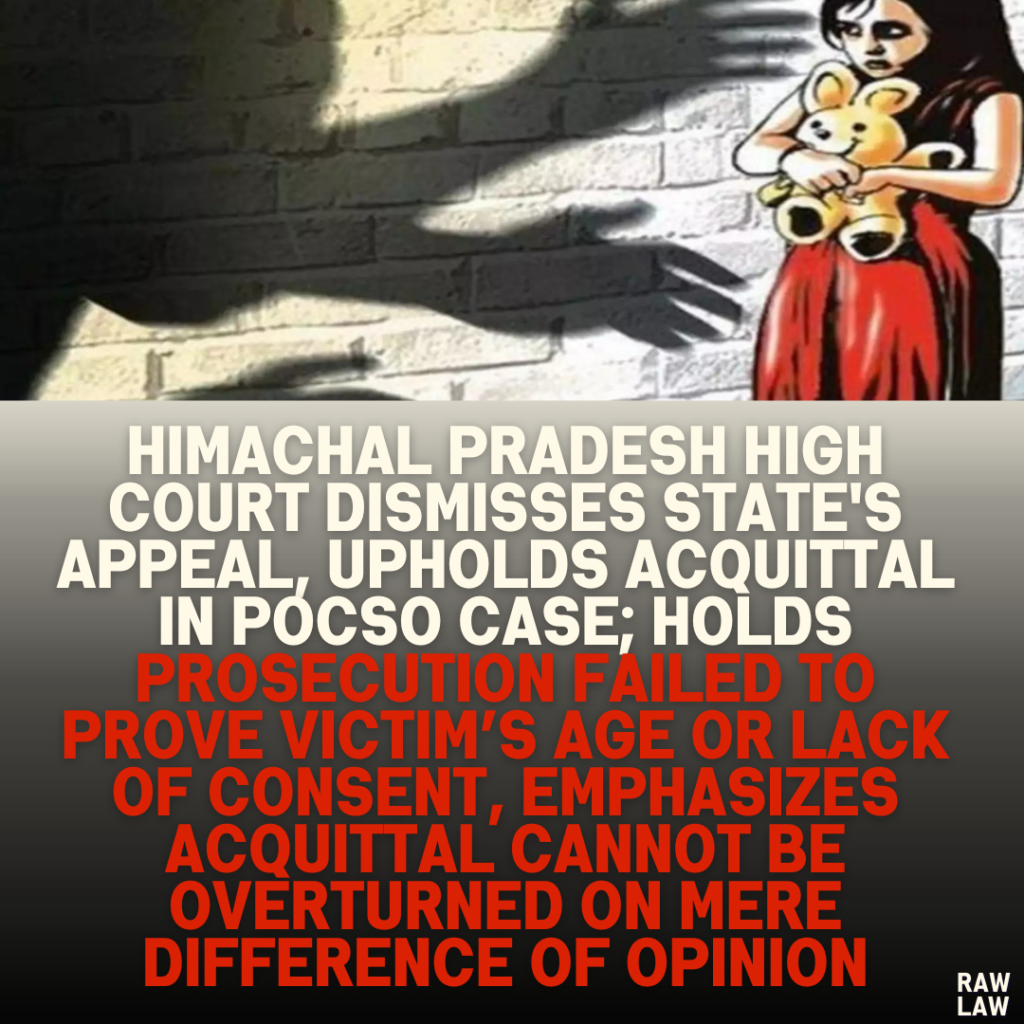Court’s Decision
The Himachal Pradesh High Court dismissed the State’s appeal against the acquittal of the accused, holding that the trial court’s findings were reasonable and based on a lack of credible evidence regarding the victim’s age and absence of consent. The court emphasized the principle that “an appeal against acquittal cannot be allowed merely on the difference of opinion.” It affirmed that the evidence did not establish the victim’s minority or non-consensual relations with the accused.
Facts
The case arose from allegations against the accused for kidnapping and sexual assault under the IPC and the POCSO Act. The informant, the victim’s father, reported her missing, suspecting abduction. Evidence recovered included letters and a pregnancy test kit. The victim, later recovered with the accused, stated she accompanied him voluntarily due to fears of her parents. The trial court acquitted the accused, citing insufficient proof of the victim’s age and consensual nature of the relationship.
Issues
- Whether the prosecution could establish the victim’s minority at the time of the incident.
- Whether the victim’s relationship with the accused was non-consensual.
- Whether the co-accused conspired to facilitate the alleged crimes.
Petitioner’s Arguments
The State argued:
- The victim was a minor, as proved by her birth records.
- Consent of a minor is irrelevant under the POCSO Act.
- The trial court erred in disregarding the corroborative evidence, including the victim’s statements and the Panchayat records.
Respondent’s Arguments
The respondents contended:
- The trial court’s findings were reasonable, highlighting discrepancies in the birth records and lack of conclusive evidence.
- The victim voluntarily accompanied the accused, as supported by her statements and conduct.
- The prosecution failed to establish any conspiracy involving the co-accused.
Analysis of the Law
The court reaffirmed that in appeals against acquittal, there must be clear evidence of illegality or perversity in the trial court’s findings. It emphasized the cardinal principle of presumption of innocence, which strengthens upon acquittal.
Precedent Analysis
The court cited:
- Mallappa v. State of Karnataka (2024), where it was held that acquittals should not be reversed based on mere differences of opinion unless there is illegality or perversity.
- Shiv Pratap Singh Rana v. State of M.P. (2024), which emphasized that voluntary companionship without protest indicates consent.
- Other rulings that highlighted the importance of natural conduct and credible evidence in cases of alleged sexual assault.
Court’s Reasoning
- Victim’s Age: The court found inconsistencies in the Panchayat and matriculation records, with overwriting and lack of credible evidence to prove the victim’s minority.
- Consent: The victim’s statements and conduct showed voluntary companionship with the accused. No allegations of force or coercion were made.
- Co-accused: The evidence did not demonstrate any conspiracy or active facilitation by the co-accused.
Conclusion
The High Court dismissed the appeal, holding that the trial court’s findings were a plausible view supported by the evidence. The prosecution failed to prove the victim’s minority or the non-consensual nature of the relationship.
Implications
The judgment reinforces the principle that appeals against acquittals must overcome a high threshold of proving illegality or perversity in the trial court’s findings. It also highlights the evidentiary challenges in establishing age and consent in cases involving the POCSO Act.



